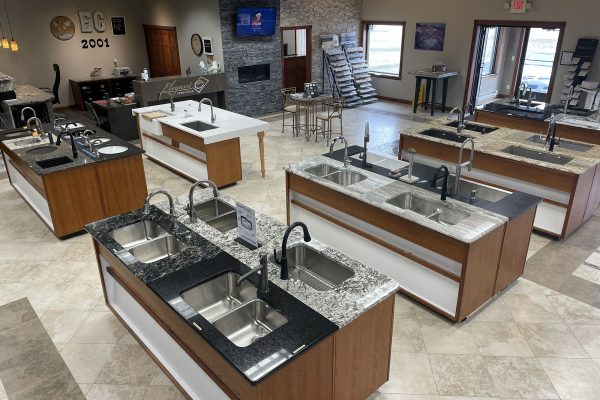The time in your life has come to purchase new countertops. Sounds like an easy breezy process, right? Well, it can be, if you know what you are up against. What material should you choose?? Butcher Block, Laminate, Quartz, Granite, Soapstone, Quartzite, Marble….and the list goes on! Most people are familiar with laminate, they know what butcher block looks like, but when it comes to stone, there can be an array of questions. The most common question we here when our customers have their initial visit is, “What is the difference between Quartz and Granite?” Short answer is: Granite is a natural stone and Quartz is a man-made stone.
Granite is a popular choice for those that appreciate the natural beauty that it has to offer. The uniqueness of each stone will vary from VERY exotic to semi-solid patterns. The more exotic the stone, typically means the more movement or variation you see, and every time you look at it, you will more than likely notice something you didn’t notice before. This is especially true when the granite covers a large area, such as a Kitchen Island. Since granite is made from extreme heat and pressure, it is typically VERY heat resistant. Meaning, that the use of trivets under your cookie sheets, hot pans, etc., can virtually be eliminated from your life. Granite is also scratch and stain resistant, you will want to clean up any spills as soon as you notice them, but staining should not be a concern, as all slabs are protected with a sealant. Sealing your granite is recommended every year, but many customers find themselves only needing to do it every 3-5 years. This is a very easy process that homeowners can do themselves (we will revisit this process in another blog). Sealing granite has gotten a bad rap, and is ONE of the reasons people lean towards Quartz.
Quartz is an umbrella term for a man-made stone that consist of approximately 93% natural Quartz and 7% resin, dyes, and epoxies. The quartz contains dyes that are appealing to the consumer as it allows for a “clean uniformed look”. If you are not a fan of the natural movement of granite, but want some of the similar “benefits” that granite has to offer, then Quartz is an excellent option. There are A LOT of Quartz Suppliers out there: HanStone, Vicostone, SileStone, Q-Quartz, Daltile, and the list goes on. We currently have about 8 main suppliers that we work with, giving our customers a large array of options to choose from. As with Granite, Quartz is also stain, scratch, and heat resistant. We recommend that you clean up any spills as soon as you notice them, as we do with granite. With Quartz you will want to use a trivet under any heat, i.e.: crock pots, electric frying pans, etc. The reason is that when heat is applied, the resin CAN expand causing tension resulting in the stone to crack. However, just like sealing granite shouldn’t “scare” you, neither should heat on quartz scare you!
At the end of the day, making the material choice that is right for you, comes down to the aesthetics you are trying to achieve. Most recently we have had several customers choose granite and quartz for their kitchens. When it comes to stone, there really is no right or wrong answer. You just need to be informed of your options and choose the one that best fits your lifestyle. We promise to assist you in any way we can to make the purchasing of a countertop enjoyable! We are here for you before the sale and LONG after your countertops have been installed.


